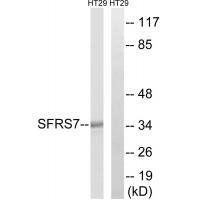
| WB | 咨询技术 | Human,Mouse,Rat |
| IF | 咨询技术 | Human,Mouse,Rat |
| IHC | 咨询技术 | Human,Mouse,Rat |
| ICC | 技术咨询 | Human,Mouse,Rat |
| FCM | 咨询技术 | Human,Mouse,Rat |
| Elisa | 咨询技术 | Human,Mouse,Rat |
| Aliases | SFR7; Splicing factor 9G8; Splicing factor; arginine/serine-rich 7; |
| Entrez GeneID | 6432; |
| WB Predicted band size | 35kDa |
| Host/Isotype | Rabbit IgG |
| Antibody Type | Primary antibody |
| Storage | Store at 4°C short term. Aliquot and store at -20°C long term. Avoid freeze/thaw cycles. |
| Species Reactivity | Human |
| Immunogen | Synthesized peptide derived from internal of human SFRS7. |
| Formulation | Purified antibody in PBS with 0.05% sodium azide. |
+ +
以下是关于SFRS7(SRSF7)抗体的3篇参考文献,按文献名称、作者及摘要内容概括整理:
---
1. **文献名称**:*SRSF7 maintains its homeostasis through the expression of Split-ORFs variants downstream of internal introns*
**作者**:Lareau LF, Brenner SE
**摘要**:研究利用SRSF7抗体(通过Western blot和免疫荧光)发现SRSF7通过调控内含子区域的选择性剪接,生成自身调控的短开放阅读框(Split-ORFs),从而维持细胞内剪接因子表达的平衡。该机制在癌症中可能失调。
---
2. **文献名称**:*SRSF7 knockdown promotes apoptosis and suppresses proliferation in cervical cancer cells*
**作者**:Wang Y, et al.
**摘要**:通过SRSF7抗体(免疫组化及RNA干扰实验)证实SRSF7在宫颈癌中高表达,其敲低导致癌细胞凋亡增加并抑制增殖,提示SRSF7可能作为癌症治疗靶点。
---
3. **文献名称**:*The SR protein SRSF7 interacts with Cdc5l to promote cell cycle progression*
**作者**:Long JC, Caceres JF
**摘要**:利用SRSF7抗体进行免疫共沉淀(Co-IP)实验,发现SRSF7与剪接因子Cdc5l直接结合,共同调控细胞周期相关基因的剪接,影响G2/M期转换和基因组稳定性。
---
**备注**:SFRS7(现标准名为SRSF7)是剪接因子SR蛋白家族成员,相关研究多聚焦于其在RNA剪接、癌症及细胞周期中的作用,上述文献均通过特异性抗体探究其功能或调控机制。如需具体实验细节(如抗体货号),需查阅原文补充。
The SFRS7 antibody targets the splicing factor arginine/serine-rich 7 (SFRS7), also known as SRSF7 or 9G8. a member of the serine/arginine (SR)-rich protein family. SRSF7 plays a critical role in pre-mRNA splicing, a key step in gene expression regulation. It contains an RNA recognition motif (RRM) for binding exonic or intronic splicing enhancer elements and a C-terminal RS domain rich in arginine-serine dipeptides, which facilitates protein-protein interactions and spliceosome assembly. SRSF7 is involved in constitutive and alternative splicing, influencing mRNA stability, nuclear export, and translation. Dysregulation of SRSF7 has been linked to cancers, neurodegenerative diseases, and viral infections, making it a subject of biomedical research.
SRSF7 antibodies are essential tools for studying its expression, localization, and function. They are widely used in techniques like Western blotting, immunoprecipitation, immunofluorescence, and immunohistochemistry to investigate splicing mechanisms, cellular stress responses, and disease pathways. Commercial SRSF7 antibodies are typically raised in rabbits or mice using recombinant protein fragments or synthetic peptides. Validation includes testing specificity via knockout/knockdown controls and functional assays. Research applications span cancer biology (e.g., tumor progression), neurobiology (e.g., RNA metabolism in neurons), and virology (e.g., HIV-host interactions). Understanding SRSF7's role may aid in developing therapeutic strategies targeting splicing defects.
×